With their appealing rewards and decentralised structure, cryptocurrencies like Bitcoin have attracted a lot of investors over the years. It is crucial to secure your crypto assets because this surge in value has also increased thefts and scams. In this post, we’ll look at various security measures you can take to guard against theft and fraud while using Bitcoin.
Selecting a safe wallet
The wallet where you store your crypto assets should be your top priority while protecting them. Your private key, necessary to access your Bitcoin address, is kept in your wallet. Hardware wallets, software wallets, and paper wallets are among the several forms of wallets. Software wallets can be secured by adhering to best practices, such as using strong passwords and enabling two-factor authentication. Still, hardware wallets are seen to be the most safe due to their physical separation from the internet. On the other hand, paper wallets provide an offline choice for long-term storage but are vulnerable to lose or physical harm.
Bitcoin security features
The decentralised, distributed architecture of Bitcoin, public key cryptography, and the blockchain protocol—a distributed ledger that keeps track of all Bitcoin transactions and makes them accessible to anyone—are the foundations of the currency’s security characteristics. These security measures pertain to randomly generated private and public keys, ensuring the validity of each transaction.
Guidelines for protecting Bitcoin assets
Utilising two-factor authentication is the first guideline for safeguarding your Bitcoin investments. Getting 2-factor authenticator apps like Google Authenticator, Authy, or other third-party apps that demand verification codes before accessing your account is an innovative practice. Ensure that the antivirus and antimalware programmes on your computer or mobile device are current.
To reduce the chance of losing your cryptocurrency assets in one location, think about storing your Bitcoin in numerous wallets. Another choice is to open an insured Bitcoin fund, although the provider says there is a storage cost associated with that. Also, remember that it is best not ever to disclose private keys.
Centralised exchanges’ risks
Utilising centralised Bitcoin exchanges presents another risk to your digital assets. These have been the target of high-profile thefts and are susceptible to hacking and cyber-attacks. Decentralised exchanges (DEX) and peer-to-peer (P2P) networks are seen as the most excellent options for trading, with decentralised exchanges based on blockchain technology being more secure and protecting investors’ privacy.
Conclusion
Investors should be aware of potential dangers and take the necessary precautions to protect themselves against security risks as cryptocurrencies continue to grow in acceptance and use worldwide. You may preserve your assets and take advantage of the advantages of investing in cryptocurrencies by selecting a secure wallet, adhering to best practices for safeguarding your crypto assets and reducing your dependency on centralised exchanges. Always remember to stay informed and exercise caution when defending your cryptocurrency holdings from outside attacks.
Finally, a properly protected hardware wallet or software wallet would give you a secure location to keep your crypto assets. Security measures like antivirus software, secure passwords, and two-factor authentication are also essential for safeguarding your money. Finally, using decentralised exchanges is a viable way to minimise any security issues associated with using centralised ones. Doing so ensures that users retain ownership over their money by removing transaction intermediaries.
